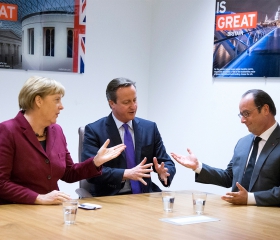On the sidelines of a recent Moscow think tank debate, “Hypocrisy vs. Diplomacy: How Insincerity Undermined the World Order After the Cold War,” Russia Direct sat down with Andrei Kortunov, general director of the Russian International Affairs Council (RIAC), to figure out how Russia and the West can get past accusing each other of engaging in double standards when it come to the implementation of foreign policy.
On the sidelines of a recent Moscow think tank debate, “Hypocrisy vs. Diplomacy: How Insincerity Undermined the World Order After the Cold War,” Russia Direct sat down with Andrei Kortunov, general director of the Russian International Affairs Council (RIAC), to figure out how Russia and the West can get past accusing each other of engaging in double standards when it come to the implementation of foreign policy.
Russian pundits and politicians believe that their Western counterparts have always been hypocritical toward Russia. Given the idealistic motivations of some Western leaders and their sincere belief in the rule of law and democracy, do you really think that they were hypocritical, as Russian experts claim?
We need to clarify the target audience [of one’s foreign policy]. If we are talking about hypocrisy toward one’s international partners, such tactics echo one’s purposeful attempt to mislead them. Such practice is normal for diplomacy and it will be the case.
However, I believe such strategy is not effective, at least because it undermines trust. But the future of international relations depends primarily on trust. Former U.S. President Ronald Reagan’s principle of “trust but verify” doesn’t seem to work anymore. International relations are becoming so sophisticated, so that…
… So that the principle of President Theodore Roosevelt, “Speak softly and carry a big stick,” seems to be more in demand today?
In general, yes. Yet, it just means if you have a big stick behind your back, your partners will accept the possibility that you are ready to use this stick. Yet if you have this big stick and don’t use it when necessary, you won’t be seen as trustworthy. Take, for example, U.S. President Barack Obama’s refusal to conduct airstrikes in Syria after Syrian President Bashar Assad allegedly used chemical weapons in 2013.
Obama drew this red line [by warning Assad against using chemical weapons], yet when this red line was crossed, he didn’t use his big stick. Unfortunately, this incident undermined his credibility in the eyes of many stakeholders. And he was seen as hypocritical, let’s say.
There is another aspect of so-called hypocrisy. It is more relevant because it deals with the domestic audience. The population of a country is reluctant to recognize its own country’s foreign policy as egoistic, destructive and deleterious for other countries and people. And today hypocrisy has become especially relevant: It is in a great deal of demand during this surge of populism, when national governments of many countries are weakening. Hypocrisy is like a popular political product sold to the domestic audience, and its future is promising in this regard.
Yet, it echoes the double standards policy, which could be used to criticize the Kremlin as well. After all, Moscow accuses the West of fueling the Syrian crisis, killing peaceful citizens and supporting terrorism, but at the same time, Russia supports Assad in bombing Aleppo, which also causes a great deal of casualties, including among the peaceful population. Moscow requires equality from the West, but sees Ukraine and other post-Soviet states as equal partners. It is pure hypocrisy as well.
Yes, it is double standards. For example, when both sides try to accuse each other of violating international law, it obviously exemplifies the double standards policy of both sides. The West says that it has been always observed the rules and principles of the United Nations and accuses Russia of violating international norms because the Kremlin recognized South Ossetia and Abkhazia as independent or annexed Crimea.
Meanwhile, Russia’s narrative is totally different. We claim that the violation of international law did not start with the Russo-Georgian conflict and the Ukrainian crisis, but much earlier — since the late 1990s and the bombing of Yugoslavia and the recognition of Kosovo’s independence. The Kremlin also points its finger at the 2003 invasion of Iraq, the 2011 military operation in Libya.
Naturally, each of the sides tries to whitewash its own sins and put the flaws of the other side in the spotlight. Yet, again, such tactics are primarily used to manipulate a domestic audience, because experts involved in the negotiations know well the international law and they can easily detect incongruities.
Yet, politicians seem to believe in their dubious narrative. For example, Putin himself sincerely believes that Western politicians are hypocritical and he seems to respond to their alleged hypocrisy in the same way — by promoting his policy, which, in fact, is based on double standards.
Well, we don’t know for sure. And he doesn’t say that Russia will be as “bad” as the West. By contrast, he seeks to be more decent and subtle in promoting his foreign policy agenda. For example, during one of the Valdai Discussion Club’s forums, when asked about the similarities between the 1999 Yugoslavia bombing and the Crimean annexation from the point of view of the violation of international law, Putin was outraged by this question.
He said that comparing Crimea and Yugoslavia was unacceptable for him, because the Yugoslavia bombing resulted in a great deal of casualties and bloodshed - thousands of people were killed and the nation’s infrastructure was damaged. By contrast, the Kremlin retook Crimea peacefully without bloodshed and large-scale shootings, according to Putin’s logic.
Yet, what about Eastern Ukraine and the ongoing Donbas war, which has killed thousands of people? According to another narrative, Russia created conditions for such a conflict and, despite denying its involvement in the war, is seen as the part of the conflict, at least because it supports the Donbas separatists.
Yes. As you asked, do really politicians really believe in their narrative, driven by idealistic motivations? We will never be able to answer this question for sure.
At least, we can assume…
If we assume, when a politician follows a certain narrative, he or she gets accustomed to it and, thus, starts believing firmly. For example, consider recently deceased Fidel Castro, Cuba’s iconic leader: he sincerely believed for the last decade of his life that he brought happiness to the Cuban people and the situation in the country would have been much worse without his contribution. It is a matter of self-justification and even self-deception. However, the key goal in this situation is to persuade one’s own target audience that your policy and behavior is right and fair.
You call such behavior self-deception, yet it might be just idealism, which is not necessarily bad and flawed. After all, many American politicians, including Democrats, sincerely believe in their messianic role in the world.
You know, the fine line here in very, very subtle. Indeed, idealism is commonplace for American politics and not necessarily bad. However, we should keep in mind that it should not overshadow professionalism. If you are a professional, you won’t be able to prove that the 2003 military operation of the United States met the rules of international law. Objectively, it is impossible no matter what idealistic motivations drive you.
I mean, in this case you should honestly say that you don’t see the international law as fundamental for international relations and there are much more important things like the freedom of the Iraqi people, let’s say. Otherwise, you won’t be seen as a professional. But the problem is that if you deny the principles of the international law in favor of abstract freedom of Iraqi people, you will face a lot of counterarguments.
Do you mean that idealism might gradually turn into self-hypocrisy, when a person starts deceiving oneself inadvertently and blindly believing in one’s narrative?
Yes. In this case, everything that contradicts this narrative will be automatically rejected. Yet, hypocrisy, unlike fanaticism that also rejects alternative or opposite views, means that a person is mindful about the fact that his or her vision is selective, incomplete and biased. Yet, regardless of this awareness, he or she rejects the other narrative that doesn’t fit his or her own.
It looks like a vicious circle that undermines trust. Could politicians really get out of it? If so, how is it possible today in the times of increasing distrust and mutual accusations?
Unfortunately, we are hardly likely to get out of this circle. Every society and every leader should draw a better image of themselves; they seek to be much better than they are in reality. That’s why they create national myths and oversimplify the reality. They just engage in cherry picking and select only those aspects that prove or fit their own narrative.
Take, for example, the way [our] politicians present Russian history. According to them, Russia turns out to have been perennially attacked and it has had to defend itself. All its military campaigns were just a response to external aggression. The same narrative is common for other countries and cultures. So, I do believe that any discourse will contain a certain dose of hypocrisy and it is inevitable. Hypocrisy becomes a side effect of diplomacy.
Interviewer: Pavel Koshkin
Source: Russia Direct







